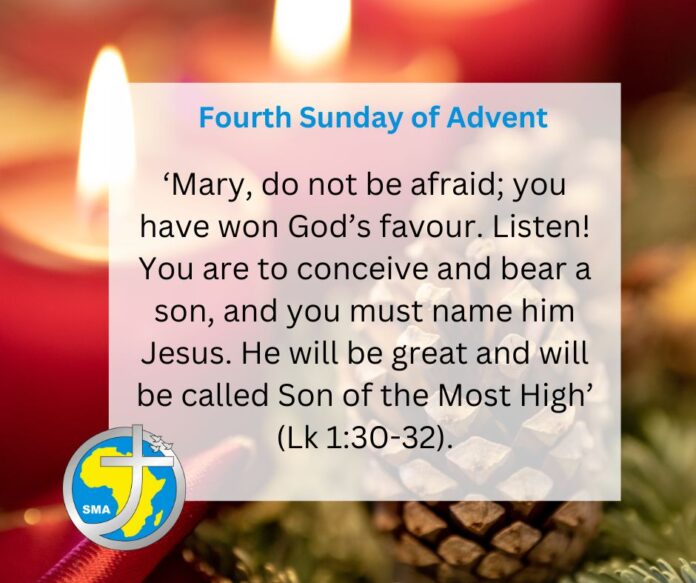Readings: 2 Samuel 7:1-5,8-11,16; Romans 16:25-27; Luke 1:26-38
Theme: Having the Courage to say ‘Yes’ to God
The role of Mary in the unfolding of God’s plan of salvation is one of the great themes of the Advent season. In today’s Eucharist, the story of the Annunciation is introduced in our opening prayer, and recounted in the gospel reading from Luke – that dramatic moment when Mary said ‘yes’ to the message of the Angel Gabriel: ‘Mary, do not be afraid; you have won God’s favour. Listen! You are to conceive and bear a son, and you must name him Jesus. He will be great and will be called Son of the Most High’ (Lk 1:30-32).
Mary’s ‘yes’ to God was probably the greatest act of faith a human being has ever made. Once assured that it was through God’s Spirit that she would become the mother of Jesus, Mary responded with the total gift of herself: ‘Be it done unto me according to your word’ (Lk 1:38). Speaking of her decisive response to the God’s invitation, Pope Francis reminds us of her courage, as well as her faith and obedience. She ‘knew how to reject fear, even while sensing that her ‘yes’ would bring her tremendously difficult trials.’
Mary’s courage in accepting to become the mother of Jesus is also highlighted by the poet, Denise Levertov, in her beautiful poem ‘Annunciation’:
Called to a destiny more momentous
than any in all of Time,
she did not quail,
only asked
a simple, ‘How can this be?’
and gravely, courteously,
took to heart the angel’s reply,
the astounding ministry she was offered:
to bear in her womb
Infinite weight and lightness; to carry
in hidden, finite inwardness,
nine months of Eternity; to contain
in slender vase of being,
the sum of power –
in narrow flesh,
the sum of light.
Mary’s courageous response to God’s word was a response she made over and over again, as the implications of her initial ‘yes’ to the angel became clear to her. I will highlight a few special moments recorded by Luke which illustrate her courage as she grew in her understanding of God’s call to her and continued to deepen the ‘yes’ she gave to God. When Mary and Joseph bring the child Jesus to the temple to be presented to the Lord, in accordance to Jewish custom, they are left wondering at the things that are being said about Jesus by Simeon. What Simeon was saying about the child was that he would be “a light to the Gentiles and the glory of Israel”. But he also prophesied that he would be “a sign of contradiction” and that “a sword will pierce” Mary’s own soul, too (Lk 2:34-35). This prophecy of Simeon must surely have troubled her. Yet it did not lead us to regret or question her initial decision but, rather, to deepen her response to the Lord.
Another incident, mentioned in Luke’s Gospel, gives us an insight of what Mary had to go through when Jesus was young boy asserting his independence. The incident occurred on the occasion of Mary and Joseph’s pilgrimage to Jerusalem when Jesus was just twelve years old. On that occasion, Jesus leaves his parents and remains behind in the Temple to converse and dispute with the doctors of the Jewish Law. After searching for him everywhere for three days, they eventually find him. On this occasion Mary speaks very sternly to her Son in words that reveal her anguish: ‘Why have you done this to us; see how worried your father and I have been, looking for you’ (Lk 2:48). Jesus’ enigmatic reply can only have sharpened her pain. “Why were you looking for me? Did you not know that I must be in my Father’s house?” (Lk 2:49). Luke tells us simply that Mary and Joseph “did not understand what he meant” (Lk 2:50).
What is striking is how Mary deals with her puzzlement and pain at what her Son has done: ‘Mary stored up all these things in her heart’ (Lk 2: 51). Perhaps it was that moment that prepared her for her most profound and courageous moment of all, her final ‘yes’ as she stood at the foot of the Cross as her Son lay dying, sharing his pain and suffering: ‘Standing by the Cross of Jesus were his mother, and his mother’s sister, Mary, the wife of Clopas, and Mary Magdalene (Jn 19:25).Unlike most of Apostles, who abandoned Jesus and fled in fear the moment he was captured, Mary stood by Jesus to the bitter end.
Mary not only accompanied her Son throughout his entire life, right up to his death and resurrection, she also accompanied the first steps of the timid and fearful early Church, praying with the men and women whom her Son had called to form his community. And Mary continues to accompany us as we strive, in our own way, to say ‘yes’ to God, and give birth to Jesus in our lives and in our world. Sometimes, like Mary, we may not understand what God is doing. And, like Mary, we are invited to ‘store up in our hearts’ the things we do not understand now, and imitate her courageous response to the Lord. I will end this homily with a prayer:
Lord, you invite us to respond to your call at every moment of our lives Give us the courage to respond with generosity, and help us to echo Mary’s ‘Yes’ in all the circumstances of our lives.
Michael McCabe SMA
To listen to an alternative Homily for this Sunday, from Fr Tom Casey of the SMA Media Centre, Ndola, Zambia please click on the play button below.
|
|

